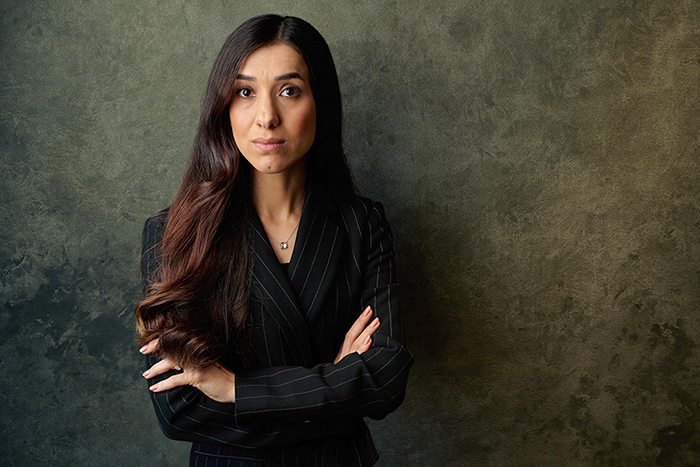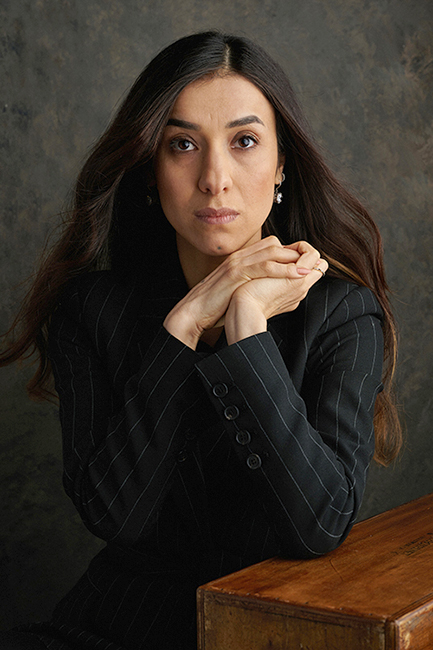‘I hope these young people will do more than hear my story’

Nobel Peace Prize laureate and founder of Nadia’s Initiative Nadia Murad, Pitzer College’s 2023 commencement speaker. Photo/courtesy of Pitzer College
Nobel laureate to speak to Pitzer grads on Saturday
By Lisa Butterworth
Nadia Murad has had a busy year. Last month she sat down with Canadian Minister of Foreign Affairs Mélanie Joly. In February she met with Saudi Foreign Minister Prince Faisal bin Farhan. And shortly before that, Murad took her friend and fellow human rights advocate, actor Angelina Jolie, to the Sinjar region of northern Iraq where she grew up, all to raise awareness about the genocide of the Yazidi people and the devastation wrought when sexual violence is used as a weapon of war.
This Saturday, the Nobel Peace Prize Laureate and Nadia’s Initiative founder will share her story of tragedy, resilience, and action with Pitzer College graduates as the class of 2023’s commencement speaker.
“Telling my story is hard. It will never stop being hard. But it is harder still when it is told, and then ignored,” Murad said, in an interview via email. “I hope these young people will do more than hear my story. I want them to remember my story, and that of the thousands of other girls like me across the world, and then act.”
In 2014, Murad was 21 years old and living with her family in her hometown of Kocho, when their Yazidi village was attacked by the Islamic State. Its goal was to eradicate the Yazidi, an ethno-religious minority in Iraq. “Yazidism is an ancient monotheistic religion … Although it has elements in common with the many religions of the Middle East, it is truly unique,” Murad writes in her memoir “The Last Girl: My Story of Captivity, and My Fight Against the Islamic State.” “I think of my religion as being an ancient tree with thousands of rings, each telling a story in the long history of Yazidis. Many of those stories, sadly, are tragedies.”

“Telling my story is hard. It will never stop being hard,” said Murad. Photo/courtesy of Pitzer College
The Islamic State considers the Yazidi to be “dirty unbelievers” and executed thousands of villagers in Sinjar, including Murad’s mother and six of her brothers. Murad was kidnapped, beaten, burned with cigarettes, and sold at auction as a “sabiyya” — or sex slave — along with more than 6,000 other young Yazidi women and girls. She was forced to convert to Islam, and was passed from one militant to another, raped on an almost daily basis.
“Every second with ISIS was part of a slow, painful death — of the body and the soul,” she writes in her memoir. “The rape was the worst part. It stripped us of our humanity and made thinking about the future — returning to Yazidi society, marrying, having children, being happy — impossible. We wished they would kill us instead.” Three months after her village was attacked, Murad escaped when her captor left a door unlocked; she was clandestinely transported to a refugee camp by a local family. From there she moved to Germany and soon began speaking out, using her story to bring attention to the injustices inflicted upon her people, and to other victims around the world.
In 2018 she founded Nadia’s Initiative, an organization dedicated to rebuilding communities — particularly in Sinjar — and advocating for survivors of sexual violence in conflict. But holding her perpetrators accountable, even when their attacks were shown to be “premeditated and bureaucratized,” has proven to be one of the biggest challenges.
“ISIS fighters had leaflets that explained at what age a young Yazidi girl could be used as a sex slave, they used Telegram and Facebook to sell us, and they even built a road between Iraq and Syria to make it easier to trade us between different parts of their so-called caliphate,” she said. “However, of the thousands of pieces of evidence gathered against these fighters, only two have been tried in a court. My people cannot heal while our rapists and captors roam free. And without obvious international legal precedent, what deterrent is there for fighters in other conflict zones?”
Despite this frustration, Murad and Nadia’s Initiative have made important strides. They’ve helped redevelop Sinjar by leading clean water and education projects, restoring land, and helping to build a new medical center. “Being able to bring sustainable solutions to a region that everyone abandoned, including the international community and our own government,” are among the organization’s biggest successes, Murad said.
She also worked to help pass the United Nations Security Council Resolution 2467, which, she said, “expands commitments to end sexual violence in conflict with a survivors-centered approach.” Another meaningful advance was the 2020 launch of the Global Code of Conduct for the Documentation and Investigation of Conflict-Related Sexual Violence. Better known as the Murad Code, it’s a guide for journalists and investigators that centers the well-being of survivors. “The way people listen to survivors and ask us questions is profoundly important,” Murad said. “[The Code] ensures that when survivors are interviewed they aren’t retraumatized, or put at risk of stigmatization.”
Being a survivor and advocating for others can be emotionally devastating work. But Murad loves being able to wake up in the morning with a purpose. She finds big joy in the little things too, she said, like drinking coffee and taking long runs. And last summer Murad began a three-year stint as Presidential Fellow in Peace Studies at Orange County’s Chapman University. “Going to school as a young activist is so important because I learn from students from all different classes about what they want to change and what social justice issues they care about,” she said. “It gives me enormous hope for the future.”
This kind of optimism is a driving force behind her visit to Pitzer as well, which will include informal meetings with students in addition to Saturday’s speech. “When these young graduates become the leaders of tomorrow,” she said, “I want them to fight meaningfully every day against injustice — so their daughters can grow up in a world where safety is not a privilege but a right.”









0 Comments